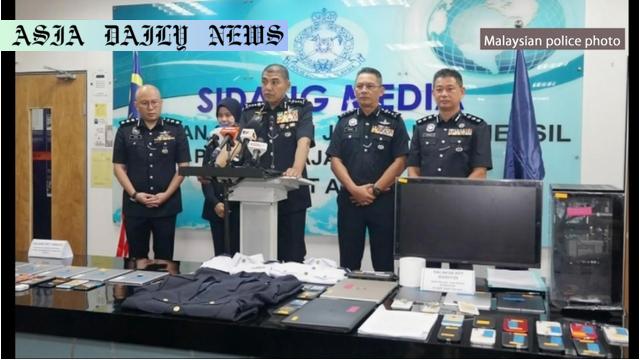Fraud: Malaysian police detained 19 foreign nationals, including 13 Japanese, over alleged scam targeting Japan.
Police in Malaysia detained 19 foreign nationals during a fraud investigation.
13 Japanese suspects targeted individuals in Japan using deceptive means.
Evidence seized included Japanese scripts, police uniforms, and gadgets.
A growing trend of fraud cases involving Japanese citizens in Southeast Asia is evident.

Introduction: Malaysia Takes Action Against Fraudulent Operations
Authorities in Malaysia recently conducted a series of raids that resulted in the detention of 19 foreign nationals for their alleged involvement in a sophisticated scam operation. Among the detained individuals are 13 Japanese citizens, who reportedly played a significant role in targeting victims located in Japan. The operations allegedly involved impersonation of Osaka police officers and other deceptive tactics, leading to the transfer of funds from unsuspecting victims to specified accounts controlled by the group.
The Fraudulent Plot Uncovered in Malaysia
Investigators revealed that the suspicious activities were conducted from two locations in and around Kuala Lumpur, Malaysia’s bustling capital. When law enforcement officials raided the premises, they found incriminating evidence pointing to coordinated fraudulent schemes. Items seized during the operation included scripts written in Japanese, clothing resembling Japanese police uniforms, smartphones, and personal computers. These materials are believed to have been instrumental in executing and manipulating the fraudulent activities targeting Japanese individuals.
Involvement of Japanese Suspects and Legal Proceedings
Out of the 19 suspects apprehended, 13 were identified as Japanese nationals. Reports suggest that these individuals actively communicated with potential victims in Japan, persuading them to transfer money under fabricated pretenses. Law enforcement authorities stated that six of the thirteen Japanese detainees were formally charged. Although they were later released after paying penalties, the legal implications of their actions remain under scrutiny. This situation highlights the mounting concern surrounding scams involving Japanese nationals within Southeast Asia.
Regional Trends: The Rise of Fraud Cases in Southeast Asia
The recent arrests in Malaysia align with a troubling trend of fraud cases emerging in Southeast Asia. Earlier this year, numerous scams linked to Japanese nationals were exposed in countries such as Myanmar and Cambodia. In Cambodia alone, over 20 Japanese citizens were detained at what was described as a fraud-scheme hub. Such occurrences indicate a broader challenge as both local and foreign individuals exploit Southeast Asia’s porous borders and relatively lax enforcement mechanisms to commit crimes targeting international victims.
The Need for International Cooperation
The arrests in Malaysia underscore the critical need for cross-border cooperation in addressing transnational crimes like fraud. Effective collaboration between Japan and Southeast Asian nations could strengthen efforts to apprehend perpetrators, dismantle fraudulent networks, and provide justice to victims. As fraud schemes grow increasingly sophisticated with the use of advanced technologies and cross-cultural tactics, governments must adopt more robust measures to safeguard against such crimes while working closely with international partners to suppress criminal activities beyond their borders.
To prevent future incidents, awareness campaigns targeting potential victims and the promotion of financial literacy could play valuable roles in mitigating risks. Additionally, stricter regulatory measures to monitor suspicious financial transactions, combined with harsher penalties for offenders, could help deter criminal activities in the region. As authorities work to unravel the full extent of fraud in Southeast Asia, the recent developments in Malaysia serve as a reminder of the urgency to prioritize public safety and uphold financial accountability across borders.
Commentary
Understanding the Impact of Fraudulent Activities
The recent fraud investigation in Malaysia, which led to the detention of 19 foreign nationals, showcases the growing threat of organized crime transcending national borders. While scams are not a new phenomenon, the sheer scale and sophistication of these schemes demand greater attention and proactive countermeasures. It is striking to note that 13 Japanese nationals were allegedly involved in targeting their own country’s citizens, reflecting the globalized nature of modern-day fraud.
The Victims and a Call for Vigilance
For the victims of these scams, the emotional and financial toll can be devastating. Deceptive tactics, such as impersonating police officers, prey on vulnerable individuals’ trust and fear of authority. This incident, unfortunately, highlights a critical need for heightened awareness among the public about common fraud methods. Governments and law enforcement agencies must step up efforts to educate citizens on identifying potential red flags and responding appropriately to suspicious scenarios. With greater public vigilance, some instances of fraud could potentially be thwarted before they escalate.
Leveraging Technology to Combat Fraud
Modern fraud is powered by technology, and so must its solutions. Law enforcement agencies around the world could enhance their use of advanced tools like artificial intelligence, blockchain tracking, and data analysis to detect suspicious activities. Transnational collaboration in sharing intelligence about fraud networks is essential, especially when perpetrators operate across multiple countries. Malaysia’s recent actions represent an important step forward, but sustained efforts are necessary to ensure that such operations are dismantled well before they harm unsuspecting individuals.
A Collective Effort for a Safer Future
The increasing number of fraud cases in Southeast Asia raises questions about accountability and how regional governments protect citizens from financial crimes. It is crucial for nations such as Japan, Malaysia, and others within the region to work collectively in implementing policy reforms, tightening laws, and fostering strong international partnerships. Only through a united front can transnational fraud be effectively curtailed. This situation serves as a reminder that combating crime is not only the responsibility of law enforcement but also of aware and vigilant citizens who can contribute to safer financial practices worldwide.


